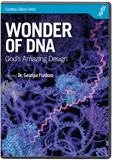Vestigial Ideas
Another study reminds us that the idea of “vestigial organs” is, itself, vestigial!
News Source
- National Geographic News: “Vestigial Organs Not So Useless After All, Studies Find”
The premise behind the idea of vestigial organs is that our bodies contain “evolutionary leftovers”—once biologically necessary but now unimportant, lingering on only because they don’t outright kill us. The appendix receives the anatomical slur most frequently—despite its documented functions that we are now aware of. Also on the list are tonsils and the spleen.
The recent study shows that the spleen stores a type of white blood cells called monocytes, which are part of the body’s immune system and also help repair damaged tissues.
A new study published recently in the journal Science has revealed an important role played by the spleen, formerly considered vestigial because it can be removed without killing the patient.1 Scientists had already learned that the spleen plays a role in filtering out old and damaged red blood cells and helping the body fight infections. The recent study shows that the spleen stores a type of white blood cells called monocytes, which are part of the body’s immune system and also help repair damaged tissues. Scientists once thought monocytes were stored only in the blood, but in fact, the spleen stores ten times as many as are in the bloodstream.
In tests on lab mice, the monocytes from the spleen played an important role in helping the mice recover from heart attacks. Study coauthor Filip Swirski of Massachusetts General Hospital explained, “If you’re going to survive a heart attack, your heart has to heal the proper way, and that depends on monocytes.”
Swirski and his colleagues made the discovery by calculating the number of monocytes that accumulated in the heart after an attack, realizing it was far more than the bloodstream harbored. In mice with removed spleens, there a “vastly fewer number” of monocytes accumulated in the heart.
The study is in accord with another made more than twenty years ago of veterans of the Second World War. Those whose spleens had been damaged or removed because of war injuries were more than twice as likely to die from heart disease and pneumonia.
National Geographic News spoke with Jeffrey Laitman, director of anatomy and functional morphology at the Mount Sinai School of Medicine, about the research. “History is littered with body parts that were called ‘useless’ simply because medical science had yet to understand them,” the report paraphrases. In that vein, we reported on the beneficial functions of the appendix in October 2007 and June 2008.
There are two key problems inherent in labeling any organ vestigial or poorly constructed. First (as Laitman indicates), given our limited knowledge, it is always possible that future studies will reveal the actual purpose of certain organs—such as was the case with the appendix and the spleen. Second, the human biology we study today exists thousands of years after the Curse and has consequently been affected by millennia of mutations and disease in addition to the abuses of the modern lifestyle. How our bodies function today is almost certainly less optimal than how God designed them.
Besides, anyone who laughs that the idea of a Designer by pointing out supposed bad design must wrestle with a more puzzling question: even if some organs function imperfectly, why nearly all put to shame even our most sophisticated technologies?
Further Reading
- Setting the Record Straight on Vestigial Organs
- Do Any Vestigial Organs Exist in Humans?
- Get Answers: Design in Nature and “Vestigial” Organs
For More Information: Get Answers
Remember, if you see a news story that might merit some attention, let us know about it! (Note: if the story originates from the Associated Press, FOX News, MSNBC, the New York Times, or another major national media outlet, we will most likely have already heard about it.) And thanks to all of our readers who have submitted great news tips to us. If you didn’t catch all the latest News to Know, why not take a look to see what you’ve missed?
(Please note that links will take you directly to the source. Answers in Genesis is not responsible for content on the websites to which we refer. For more information, please see our Privacy Policy.)
Footnotes
- Filip K. Swirski et al., “Identification of Splenic Reservoir Monocytes and Their Deployment to Inflammatory Sites,” Science 325, no. 5940 (July 31, 2009: 612–616, doi:10.1126/science.1175202.
Recommended Resources

Answers in Genesis is an apologetics ministry, dedicated to helping Christians defend their faith and proclaim the good news of Jesus Christ.
- Customer Service 800.778.3390
- © 2024 Answers in Genesis







